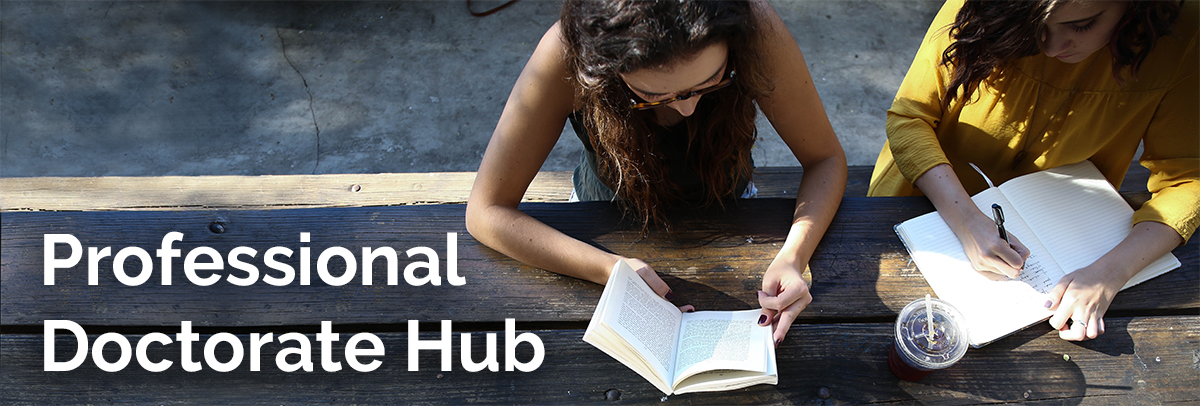This content is associated with The Open University's Professional Doctorates (EdD/DHSC)
When undertaking a Professional Doctorate, such as the EdD or the DHSC, successful candidates write a thesis which makes an original contribution to knowledge. These degrees are usually undertaken part-time by mid- to late-career professionals who write a thesis that contributes towards both theory and professional practice. This sounds like a straightforward undertaking. Most professionals are familiar with and committed to research informed practice. However, the relationship between research and practice is not always straightforward or linear.
Academic knowledge is always explicit. It is not always experiential. It is often expressed through essays or other types of writing. It is communal, in as much as it is often pulled together based on what several other people researching, writing and thinking about the same subject have said in previous years. Professional knowledge is sometimes explicit but often people know more than they can articulate. They know with their hands and their bodies. It is usually expressed in action. It is communal, in as much as one person may contribute a particular part of a whole process. Researching, writing and thinking all give way to doing.
In these videos Professional Doctorates at various stages of their academic journey talk with Dr Fiona Aubrey-Smith and Dr Carol Azumah Dennis about the relationship between the academic knowledge they are developing by virtue of studying for a doctorate, and the practical professional knowledge they work with on a day-to-day basis. For most of them, it is an exciting and exhilarating journey in which what was once familiar is seen through fresh eyes as something unexpected and new.
Throughout each of these videos our central question was, ‘How do people negotiate the differences between academic and professional knowledge’.Gillian Ferguson
Transcript
(55.3 KB)
Insights from Gillian Ferguson
In 2021, Dr Gillian Ferguson, completed a Professional Doctoral thesis entitled When David Bowie created Ziggy Stardust: the Lived Experiences of Social Workers Learning Through Work.
Her qualitative study offers valuable insights into how social workers learn through work. Sitting at the intersection between knowledge about workplace and professional learning the study explored the lived experiences of social workers’ learning to become social workers. She used an approach known as Interpretative Phenomenological Analysis.
In this interview, Dr Fiona Audrey-Smith talks with Dr Ferguson about how changing her job midway through her Prof Doc affected her studies.
In recounting her doctoral journey, she explains that what started with a very practical exploration (how people learn to be an effective social worker) had to engage with a philosophical exploration before she was able to solve the practical question. While all Professional Doctorates start with a clear research proposal and plan, Gillian found that her thinking evolved over time and new considerations emerged which then re-shaped the study itself. Ultimately, moving job provided a new perspective which supported a more insightful relationship with the subject.
Gillian also spoke about the conflicts she experiences between her established professional knowledge and emerging academic knowledge.
What it means to be a good and effective social worker changes from person to person, and context to context. What started as a practical question very quickly shifted to become a philosophical investigation which ultimately helped Gillian define her key concepts: What we mean by learning? What counts as worthwhile knowledge? How do these definitions change according to context?
The study drew from both practical and theoretical knowledge to respond to the research question. A Professional Doctoral thesis is usually 65,000 words. But 65,000 words were not enough for Gillian whose project made use of visual diagrams to explains her central concepts and illustrate the emergence of new knowledge.
For Dr Ferguson, academic knowledge generated by her study was immediately translated into professional knowledge and is ow being used to inform the professional practice of social workers. Gillian made us think again about what makes knowledge academic. And what makes knowledge professional? And how do these different forms of knowledge emerge?
We have not yet definitively answered this question but after chatting with Gillian we concluded that sometimes knowledge changes depending on it use: how it is being used, who is using it, where is it being used and for what purpose?
We like to think of knowledge as static. What Gillian and her thesis demonstrates is that knowledge is always changing.
Dr Aubrey-Smith asked Gillian what advice she would offer prospective ProfDoc researchers or those starting their journey.
Gillian advised:
- Be open to how your identity may change as you move through the doctoral journey – so choose a research topic that really matters to you.
- Take notice of where you are at different points during the study. How does your evolving knowledge and identity shape the way you look at the study?
- Remember that you have professional expertise to bring into your doctoral study.
- The doctoral journey is a deeply personal journey – be open and aware of that.
Kathy Chandler
Transcript
(51.1 KB)
Insights from Kathy Chandler
In 2022, Dr Chandler completed a thesis entitled Students’ experiences of synchronous online tuition in health and social care
Her study explores students’ experiences of synchronous online tuition within the context of teaching health and social care in a large UK-based distance learning university. In this interview, Dr Fiona Audrey-Smith begins by asking Dr Chandler about the changes she experienced as a result of her professional doctorate journey. Kathy recounts an immediate and direct career impact. She started the degree as a part-time hourly paid lecturer by the time her thesis was completed, she was promoted to a full-time salaried post. But this was not all. She also found that her networks and relationships with a wide range of colleagues were developed which further gave her access to new perspectives, different people, roles and projects
Her thesis made explicit relevance for her workplace and examples from the thesis have been used in staff development with findings being shared in international conferences and journals. For Kathy, her research has contributed to ongoing policy discussions.
This does not imply a neat linearity between academic and professional knowledge for Dr Chandler. There were moments of coherence and other moments of friction between her professional knowledge and academic knowledge? For Kathy this meant that her professional knowledge often meant she wanted to pre-empt what her research would reveal. This is a risk for Professional Doctorate who are experienced and knowledgeable about their workplace. There is little to gain from a thesis that explores what you already know. Kathy found that it was important to be open to what the data you have generated reveals. This can only happen when you challenge your existing ideas and allow new, unanticipated and unexpected kinds of insight.
Kathy found that an academic lens helped her to surface possibilities that she had not previously considered when looking at the world exclusively through a professional lens. Undertaking original research using methods she was unused to and subjecting her data to rigorous, systematic analysis reveals contexts and influences to which as a professional she was completely oblivious. Kathy illustrates well the value of looking at the everyday familiar with fresh academic eyes.
One thing that happens to a number of professional doctorates is that their sense of who they are changes. They assume a new identity. Dr Aubrey-Smith asks Kathy how her sense of self developed during her professional doctorate journey?
Kathy believes that all students begin their professional doctorate journey suffering from imposter syndrome. This might be exaggerated for people who occupy certain professional roles. But all is not lost. There are ways to manage these uncomfortable feelings. Kathy found herself reflecting on her evolving identity which meant developing ideas within her writing. Academic writers talk about ‘voice’ in their work. Kathy advises thinking about the voice you use when writing, how this impacts on what you say and how you say it. There are other experiences that made a huge difference to Dr Chandler. Researching her own professional space encouraged her to think about the implications of what is called ‘insider’ research. We use the phrase ‘insider research’ when people research their day-to-day professional situation. That is research undertaken from ‘inside’ a context. For instance, teachers researching their own school or classroom is considered ‘insider’ research. It stands in contrast to research into teaching undertaken by an academic employed by a university (an ‘outsider’). Insider research refers to research undertaken by ‘insiders’. Social workers researching social work. Nurses undertaking research within the NHS. Kathy talks a great deal about how her professional knowledge made a huge difference to her study. It takes between four and eight years to complete a professional doctorate. It’s a long journey – a lot happens on those years both professionally and academically.
Kathy talks a great deal about how her professional knowledge made a huge difference to her study. It takes between four and eight years to complete a professional doctorate. It’s a long journey – a lot happens on those years both professionally and academically.
If you’d like to read more about Kathy’s work. Especially about voice, which was central to her research method, you may access her recently published work on voice centred relational methodology.
Dr Aubrey-Smith asked Kathy what advice she would offer prospective ProfDoc researchers or those starting their journey.
Kathy advises:
- If you’re thinking about doing a professional doctorate – do it! It’s not straightforward – think of it as climbing a mountain, but it is definitely worth it.
- Look after your own health and wellbeing – it’s a long journey. Remember to balance your work, studies and self-care.
- Take every opportunity to connect with other people – share your ideas, hear ideas from others. Ideas that inform your thesis will not always come from academics or professional colleagues.
- Having a research supervisor is a great opportunity to benefit from insights, challenge, support and experience. Plan questions to ask them, record and rewatch those supervision conversations.
Kris Stutchbury
Transcript
59.3 KB
Insights from Kris Stutchbury
In 2019, Dr
Stuchbury complete a thesis entitled Teacher
Educators as Agents of Change? A Critical Realist Study of a Group of Teacher
Educators in a Kenyan University.
This study focuses on the professional identity of a group of teacher educators in a Kenyan university. To improve student outcomes in sub-Saharan Africa, the quality of teaching and therefore the quality of teacher education (TE) needs to improve. Policy aspirations across the region call for a greater focus on the teaching and learning of skills, attitudes and values, with many making specific reference to learner-centred education (LCE); teachers need to change their practice, which means that teacher educators need to change as well. The study concludes that these pedagogic changes require a public consensus around the nature of knowledge about teaching, alongside conscious efforts to create opportunities for collaboration amongst teacher educators.
In this interview, Dr Fiona Audrey-Smith begins by asking Dr Stuchbury about how she learnt what she learnt as a result of her study. Kris worked with a particular theoretical framework known as critical realism. What attracted Kris to Critical Realism was because it allowed her to always ask ‘why’ – why are particular things happening; critical realists like Kris compare knowledge about the world to an iceberg – you can see some things but there is always a lot more underneath gig on just under the surface that you can’t see straight away. Once you adopt this stance when looking at the world, your understanding changes. You begin to understand with greater clarity how to work with theories and data. There is always more to the world that we can see.
Dr Stuchbury, like many of Professional Doctorates, experienced important differences between academic and professional ways of knowing. We asked her about the coherence or friction she experienced when working between these different ways of knowing. She initially approached her subject as a teacher educator, a professional – identifying the most relevant and useful academic knowledge takes time and deep thought. She was aware that academic language can make things sound unnecessarily complicated. She decided that it was helpful to invest time in drawing out her own understanding and making it relevant to her own professional knowledge.
Kris also found that her sense of self changed as she progressed towards her doctorate. When she started her professional doctorate journey, she was secure in the sense of herself as a teacher education. A professional. This identity dominated her sense of who she was. But, after years of looking at her professional life through an academic lens, that began to change. By the end of her doctorate a new sense of self as an academic emerged.
Based on her experience of the EdD, Kris offers advice to prospective ProfDoc researchers or those starting their journey.
- The professional doctorate gives you an opportunity to read – as academics it is important that we keep reading and contribute our perspective to professional and academic discussions.
- Always have something on your phone or printed out with you that you can read – little pockets of time (e.g. waiting in a car for someone) can be used for reading
- Make sure you know what is coming next – plan ahead, mapping out your next few steps at every stage.
Mel Green
Transcript
(53.3 KB)
Insights from Mel Green
Mel Green began the
third year of her doctoral journey in October 2022. She is working towards the
completion of a thesis entitled:
Exploring the relationship between professional identity of higher
education practitioners and intersections with their personal identity, and how
this affects their online teaching.
The professional Doctorate is a journey into the unknown. In making the familiar strange, many postgraduate researchers find what they thought they know challenged, extended, changed or completely revised. This leads to sometimes changes in their sense of self. Mel’s research is focused on the importance of identity and its relationship to the professional practice of online teachers. It is a topic that emerged from her personal expereinces of being an online teacher at the Open University and the ways in which her identity (as a former primary school teacher, as a mother, as a black women, as someone committed to equity and social justice) impacted her pedagogical choices.
Studying for 181/2 hours per week, while working full-time is a challenge. Mel reflects on how a particular text had a huge influence on her perception of herself and the world. So much so that it prompted her to rethink ‘being a teacher’ as both personal and professional, which ultimately had an impact on her professional practice. She realised that students are not just brains to be filled with knowledge. They are human beings with hopes, dreams, anxieties and cultures – all of these things shape how they engage with knowledge. The writer and activist bell hooks inspired Mel’s academic journey and remains one of her academic heroes.
In the video chat between Mel and Dr Carol Azumah Dennis, they touched upon the relationships between academic knowledge and professional knowledge experienced so far on Mel’s doctoral journey. Mel has found that academic knowledge has subverted her professional knowledge leading to immediate improvements in her professional practice. She has also found the new thinking encountered in her professional doctorate has prompt a series of reflections which has led to her changing her pedagogic practice. This process of working within and between academic and professional knowledge is an unsettling challenge but also an essential part of making sense and making meaning.
Based on her experience of the EdD, Mel offers advice to prospective ProfDoc researchers or those starting their journey.
- Talk about your research with as many different people as possible – different perspectives prompt you to consider different elements and relationships between ideas.
- The journey gives you access to people, sources and opportunities that all feed into your thinking – make the most of these opportunities.
- Your confidence naturally grows as you develop through your doctoral journey – this leads to opportunities and ideas that you may not otherwise have considered.
- Develop an organised way of working as soon as you can – using reference management tools, how you keep your notes and ideas etc.
Rehana Awan
Transcript
(49.6 KB)
Insights from Rehana Awan
Rehana Awan began the third year of her doctoral journey in October 2022. She is working towards the completion of a thesis entitled: The awarding gap for black and brown students at the Open University - using narrative inquiry - to understand the impact on students and how we can support them in the future.
In a similar vein to all the Professional Doctorate researcher Dr Fiona Aubrey-Smith and Dr Carol Azumah Dennis have spoken to, Rehana’s professional knowledge relates strongly to the academic knowledge she is developing through her research. She notes for example that experience gathered during current and prior professional roles has fed into how the topic of education inequity is being approached. Her extensive professional knowledge and expereinces enables her to recognise the challenges involved in this very tricky issue and compels her to probe specific complexities. There is complementarity between Rehana’s developing academic knowledge which informs her professional practice as well as providing insights into the ways in professional practice might be developed at organisational level.
While Rehana appreciates the complementarity between her developing academic knowledge and professional practice at both a personal and organisational level, there are moments when the two ways of knowing are less easily melded. She also talks about her research as unframing professional knowledge. We use a frame to set the parameters of a particular subject. The frame helps us decide which bits or any experience are relevant to the issue under exploration. When that issue is unframed, we are compelled to draw on ideas, expereinces, phenomena which we had previously thought of as having little or no influence over our subject. Rehana has found that academic probing unframes aspects of professional practice. Nothing is as neatly contained and linear as she had once thought. This can create tensions. But it is part of making the familiar strange. It provides us with new perspectives, unexpected opportunities, and previously unthought of ways to understand and therefore improve practice.
If the Professional Doctor is to change professional practice it needs to influence more than the individual on the doctoral journey. Dr Fiona Aubrey-Smith and Rehana spent some time thinking about the audiences who Rehana has engaged with as part of her research. Rehana has drawn in colleagues who are part of staff development. She has ensured that they understanding the findings emerging from her research and their implications. These colleagues are able to extend the reach of her work as they have huge influence over the professional practice at an organisational level. As well as colleagues., Rehana has engaged with students who participated in her studies, contributing toward the research itself as interviewees, or survey respondents. The research is about inequity in education. But students are not always aware of what or how particular features may affect them. Rehana’s research suggest that when students are better informed about the implications of their personal situation, they are more likely to seek specific support. Her has potential to empower students to make better, more informed study decisions.
Dr Aubrey-Smith asked Rehana about the advice she would offer prospective ProfDoc researchers or those starting their journey.
Rehana advises:
- Carve out time and find ways to organise your available study time.
- Be clear about what you want to find out about at each stage.
- Doctoral research is a marathon rather than a sprint – so celebrate each milestone.
To learn more about our current projects, head over to our PRAXIS website.

This piece of content is part of the 'Professional Doctorate Hub', a collection of academic-led info, from articles and infographics to animations. Click on the banner above or CLICK HERE to view all materials.
Explore Postgraduate Qualifications at The OU:
-
Professional Doctorates (EdD/DHSC)
Learn more to access more details of Professional Doctorates (EdD/DHSC)
-
Professional Doctorate in Health and Social Care (DHSC)
Learn more to access more details of Professional Doctorate in Health and Social Care (DHSC)
-

Learn more about studying at Postgraduate level:
-
Succeeding in postgraduate study
Learn more to access more details of Succeeding in postgraduate studyThis course will help you to become familiar with the requirements and demands of postgraduate study and to develop the skills and confidence to pursue your learning further.

Rate and Review
Rate this article
Review this article
Log into OpenLearn to leave reviews and join in the conversation.
Article reviews